新概念英语第一册第19课第20课
新概念英语第一册第20课课文及详解
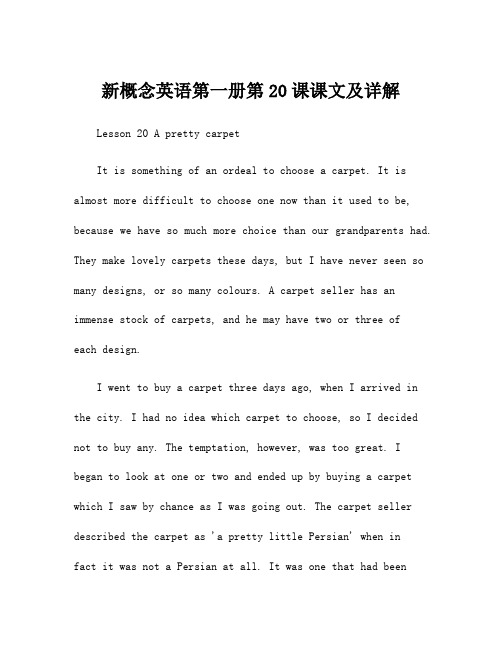
新概念英语第一册第20课课文及详解Lesson 20 A pretty carpetIt is something of an ordeal to choose a carpet. It is almost more difficult to choose one now than it used to be, because we have so much more choice than our grandparents had. They make lovely carpets these days, but I have never seen so many designs, or so many colours. A carpet seller has an immense stock of carpets, and he may have two or three ofeach design.I went to buy a carpet three days ago, when I arrived in the city. I had no idea which carpet to choose, so I decided not to buy any. The temptation, however, was too great. I began to look at one or two and ended up by buying a carpet which I saw by chance as I was going out. The carpet seller described the carpet as 'a pretty little Persian' when infact it was not a Persian at all. It was one that had beenmade in a factory an hour's drive away. The carpet seller would have called any carpet 'a pretty little Persian', but I was not deceived. I did not care what it was called; I was simply attracted by its design and colour. Nevertheless, the carpet seller had a habit of making everyone feel he had got something really special. On the way out, he put his hand on my shoulder and said, 'You've made a good choice, Sir!' I was still wondering whether I had, when I got it back to the hotel. As I was admiring it in my room, a friend of mine came in and admired it too. He asked me how much I had paid for it and I told him the price. 'I am the carpet seller in the city,' he said, laughing, 'but when I sell a carpet, I never tell people the price I paid for it!'【课文讲解】1. It is something of an ordeal to choose a carpet.【译文】挑选一张地毯,真是一场折磨。
新概念英语第一册每课知识点课
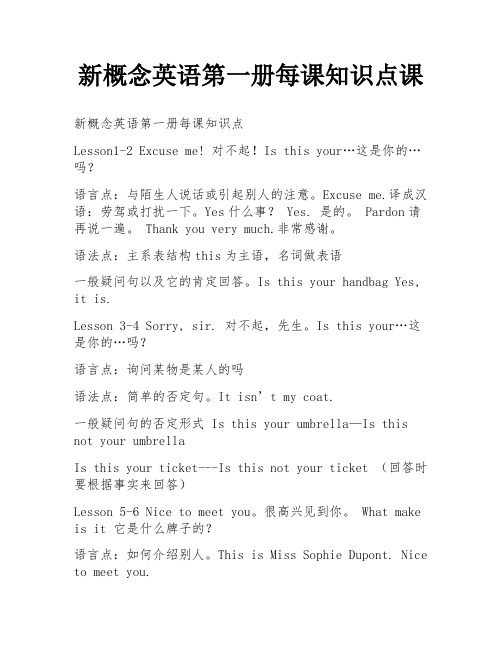
新概念英语第一册每课知识点课新概念英语第一册每课知识点Lesson1-2 Excuse me! 对不起!Is this your…这是你的…吗?语言点:与陌生人说话或引起别人的注意。
Excuse me.译成汉语:劳驾或打扰一下。
Yes什么事? Yes. 是的。
Pardon请再说一遍。
Thank you very much.非常感谢。
语法点:主系表结构this为主语,名词做表语一般疑问句以及它的肯定回答。
Is this your handbag Yes, it is.Lesson 3-4 Sorry, sir. 对不起,先生。
Is this your…这是你的…吗?语言点:询问某物是某人的吗语法点:简单的否定句。
It isn’t my coat.一般疑问句的否定形式 Is this your umbrella—Is this not your umbrellaIs this your ticket---Is this not your ticket (回答时要根据事实来回答)Lesson 5-6 Nice to meet you。
很高兴见到你。
What make is it 它是什么牌子的?语言点:如何介绍别人。
This is Miss Sophie Dupont. Nice to meet you.询问物品的牌子:What make is +单数可数名词?语法点:主语为第三人称单数的主系表结构。
She is French. He is German. It’s a Volvo.(L6)a/an 的使用。
选择疑问句 ---一般选择疑问句和特殊选择疑问句Lesson 7-8 Are you a teacher 你是教师吗?What’s your job你是做什么工作的?语言点:如何自我介绍和相互认识。
询问职业的表达法。
What’s your job询问国籍的表达法。
What nationality are you语法点:主语为第二人称的主系表结构。
新概念英语第一册课文1-143
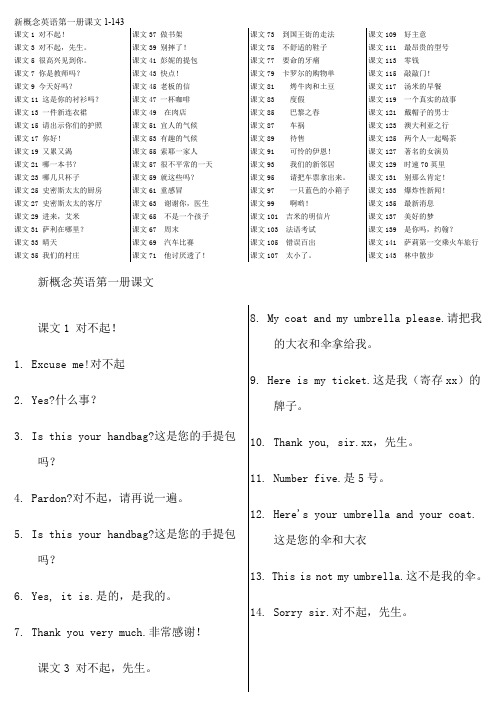
课文1 对不起!课文3 对不起,先生。
课文5 很高兴见到你。
课文7 你是教师吗?课文9 今天好吗?课文11 这是你的衬衫吗?课文13 一件新连衣裙课文15 请出示你们的护照课文17 你好!课文19 又累又渴课文21 哪一本书?课文23 哪几只杯子课文25 史密斯太太的厨房课文27 史密斯太太的客厅课文29 进来,艾米课文31 萨利在哪里?课文33 晴天课文35 我们的村庄课文37 做书架课文39 别摔了!课文41 彭妮的提包课文43 快点!课文45 老板的信课文47 一杯咖啡课文49 在肉店课文51 宜人的气候课文53 有趣的气候课文55 索耶一家人课文57 很不平常的一天课文59 就这些吗?课文61 重感冒课文63 谢谢你,医生课文65 不是一个孩子课文67 周末课文69 汽车比赛课文71 他讨厌透了!课文73 到国王街的走法课文75 不舒适的鞋子课文77 要命的牙痛课文79 卡罗尔的购物单课文81 烤牛肉和土豆课文83 度假课文85 巴黎之春课文87 车祸课文89 待售课文91 可怜的伊恩!课文93 我们的新邻居课文95 请把车票拿出来。
课文97 一只蓝色的小箱子课文99 啊哟!课文101 吉米的明信片课文103 法语考试课文105 错误百出课文107 太小了。
课文109 好主意课文111 最昂贵的型号课文113 零钱课文115 敲敲门!课文117 汤米的早餐课文119 一个真实的故事课文121 戴帽子的男士课文123 澳大利亚之行课文125 两个人一起喝茶课文127 著名的女演员课文129 时速70英里课文131 别那么肯定!课文133 爆炸性新闻!课文135 最新消息课文137 美好的梦课文139 是你吗,约翰?课文141 萨莉第一交乘火车旅行课文143 林中散步新概念英语第一册课文课文1 对不起!1. Excuse me!对不起2. Yes?什么事?3. Is this your handbag?这是您的手提包吗?4. Pardon?对不起,请再说一遍。
新概念第一册1-20课语法重点
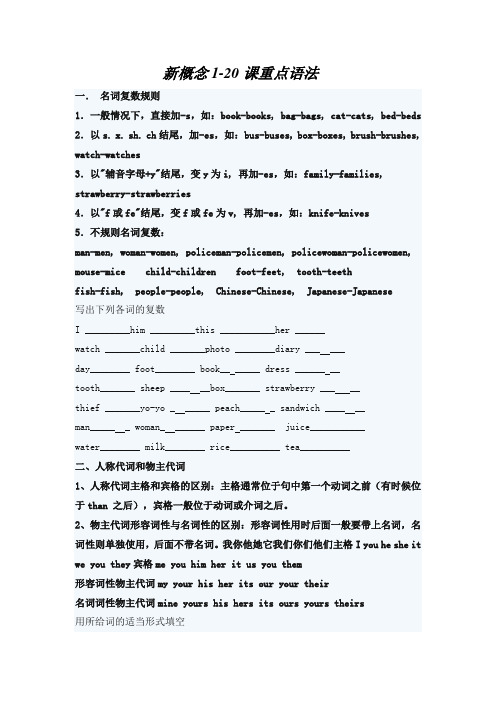
新概念1-20课重点语法一.名词复数规则1.一般情况下,直接加-s,如:book-books, bag-bags, cat-cats, bed-beds 2.以s. x. sh. ch结尾,加-es,如:bus-buses, box-boxes, brush-brushes, watch-watches3.以"辅音字母+y"结尾,变y为i, 再加-es,如:family-families, strawberry-strawberries4.以"f或fe"结尾,变f或fe为v, 再加-es,如:knife-knives5.不规则名词复数:man-men, woman-women, policeman-policemen, policewoman-policewomen, mouse-mice child-children foot-feet, tooth-teethfish-fish, people-people, Chinese-Chinese, Japanese-Japanese写出下列各词的复数I _________him _________this ___________her ______watch _______child _______photo ________diary ___ ___day________ foot________ book__ _____ dress ______ __tooth_______ sheep ____ __box_______ strawberry ___ __thief _______yo-yo _ _____ peach_____ _ sandwich ____ __man_____ _ woman_ ______ paper _______ juice___________water________ milk________ rice__________ tea__________二、人称代词和物主代词1、人称代词主格和宾格的区别:主格通常位于句中第一个动词之前(有时候位于than 之后),宾格一般位于动词或介词之后。
新概念英语第一册第20课lesson20课件——one man in a boat

catch sight of:看见=see
catch up with :赶上,跟上
eg. Go ahead please.I’ll soon catch up with you
★fisherman n. 钓鱼人,渔民 fish→ fisherman (pl.fishermen) [注]不要忘了er 1)fish 鱼 (pl.) 单复数同形
even 甚至 more/less lucky less+原级 (消极比较级) : A is less ... than B A比B更不...
I am less happy than before. This story is less interesting than that one.
练习题: 用括号内动词的适当形式填空:
work. 14.A lot of men have given up _w__e_ar_i_n_g__(wear) hats. 15.She is very interested in _d_a_n_c_in_g__ (dance). 16.On _e_n_te_r_i_n_g (enter) the room, he turned on the light.
I oftenห้องสมุดไป่ตู้fish for hours without catching anything.
without prep. 没有 (可放句首,句尾) prep + n./v.-ing/pron.
He went out without saying anything. =He went out and he didn’t say anything. I can not live without you. 我离开你不能活。 But this does not worry me. worry v. 使…担心 worry sb.使…担心 困扰某人
新概念英语第一册课文原文+精讲汇总(144课完整版)
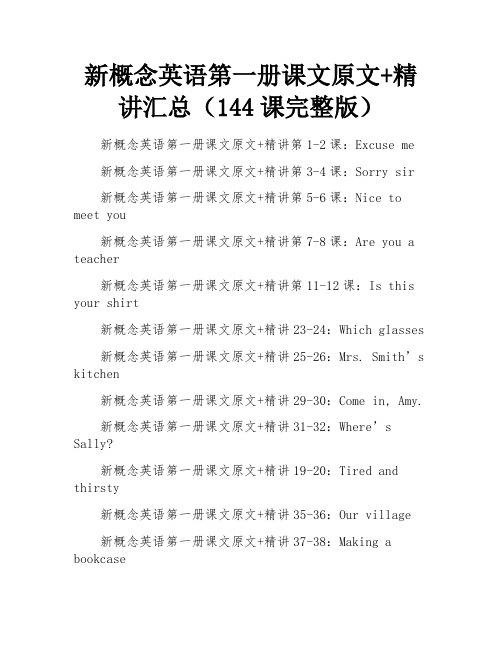
新概念英语第一册课文原文+精讲汇总(144课完整版)新概念英语第一册课文原文+精讲第1-2课:Excuse me新概念英语第一册课文原文+精讲第3-4课:Sorry sir新概念英语第一册课文原文+精讲第5-6课:Nice to meet you新概念英语第一册课文原文+精讲第7-8课:Are you a teacher新概念英语第一册课文原文+精讲第11-12课:Is this your shirt新概念英语第一册课文原文+精讲23-24:Which glasses新概念英语第一册课文原文+精讲25-26:Mrs. Smith’s kitchen新概念英语第一册课文原文+精讲29-30:Come in, Amy.新概念英语第一册课文原文+精讲31-32:Where’s Sally?新概念英语第一册课文原文+精讲19-20:Tired and thirsty新概念英语第一册课文原文+精讲35-36:Our village新概念英语第一册课文原文+精讲37-38:Making a bookcaseit!新概念英语第一册课文原文+精讲41-42:Penny’s bag新概念英语第一册课文原文+精讲33-34:A fine day新概念英语第一册课文原文+精讲43-44:Hurry up新概念英语第一册课文原文+精讲45-46:The boss’s letter新概念英语第一册课文原文+精讲47-48:A cup of coffee新概念英语第一册课文原文+精讲53-54:An interesting climate新概念英语第一册课文原文+精讲55-56:The Sawyer family新概念英语第一册课文原文+精讲57-58:An unusual day新概念英语第一册课文原文+精讲59-60:Is that all新概念英语第一册课文原文+精讲61-62:A bad cold新概念英语第一册课文原文+精讲63-64:Thank you , doctor新概念英语第一册课文原文+精讲67-68:The weekend新概念英语第一册课文原文+精讲69-70:The car race新概念英语第一册课文原文+精讲71-72:He’s awfulKing Street新概念英语第一册课文原文+精讲75-76:Unfortable shoes新概念英语第一册课文原文+精讲77-78:Terrible toothache新概念英语第一册课文原文+精讲81-82:Roast beef and potato新概念英语第一册课文原文+精讲83-84:Going on a holiday新概念英语第一册课文原文+精讲85课:Paris in the Spring新概念英语第一册课文原文+精讲87课:A car crash新概念英语第一册课文原文+精讲89课:For sale新概念英语第一册课文原文+精讲91课:Poor Ian新概念英语第一册课文原文+精讲93课:Our new neighbor新概念英语第一册课文原文+精讲95课:Ticket, please.新概念英语第一册课文原文+精讲97课:A small blue case新概念英语第一册课文原文+精讲99课:Ow!新概念英语第一册课文原文+精讲101课:A card from Jimmytest新概念英语第一册课文原文+精讲105课:Full of mistakes新概念英语第一册课文原文+精讲107课:It’s too small新概念英语第一册课文原文+精讲109课:A good idea新概念英语第一册课文原文+精讲111课:The most expensive model新概念英语第一册课文原文+精讲113课:small change新概念英语第一册课文原文+精讲115课:Knock,knock新概念英语第一册课文原文+精讲117课:Tommy’s breakfast新概念英语第一册课文原文+精讲119课: A true story新概念英语第一册课文原文+精讲121课: The man in the hat新概念英语第一册课文原文+精讲123课: A trip to Australia新概念英语第一册课文原文+精讲125课: Tea for two新概念英语第一册课文原文+精讲127课: A famous actress新概念英语第一册课文原文+精讲129课: 70 miles an hour新概念英语第一册课文原文+精讲133课: Sensational news新概念英语第一册课文原文+精讲135课:The latest新概念英语第一册课文原文+精讲139课:Is that you新概念英语第一册课文原文+精讲第141课:Sally’s first新概念英语第一册课文原文+精讲131课:Don’t be so sure。
新概念英语第一册-第19-20课资料

Lesson 20 Look at them!
Lesson 20 Look at them!
• New word and expressions • 1 big [big] a.大的 • 2 small [smɔ:l] a.小的 • 3 open ['əupən] a.开着的 • 4 shut [ʃʌt] a.关着的 closed • 5 light [lait] a.轻的
Mother: What's the matter, children? Girl: We're tired … Boy: … and thirsty, Mum.
Mother: Sit down here. Mother: Are you all right now?
Boy: No, we aren't. Mother: Look! There’s an ice cream man.
sit down [´sɪt-daʊn] 坐下
right [raɪt]
adj.好,可以
ice cream [´aɪs- ´kri:m] 冰淇淋
matter
children
thirsty
sit down
ice cream
right tired
Listen!
1、What's the matter with children? 2、What does their mother buy? 3、Why do the children thank mother?
Here you are.给你
Girl: These ice creams are nice.
•these 这些 those 那些
•this 这个
新概念英语第一册19,20,21课

• pencil sharpener
• 3)n.夏普 • Brother Sharp 犀利哥
-en后缀或en-前缀
• 前缀en-和后缀-en尽管词缀形式相同,但两者的构词功能 迥然不同,前者仅用作动词词缀,而后者可作动词、形容 词及名词词缀. • 后缀-en的构词功能 • 接在某些形容词后面构成动词,有“做”、“使”、“成 为”、“使……变成”等含义。例如:shorten(使缩 短), darken(使黑,变黑),deepen(加深,使深), broaden(加宽),sharpen(削尖),sweeten(使变 甜),thicken(使变厚),quicken(加快),soften (使软化)blacken(使变黑),harden(变硬、硬化), weaken(变弱),fasten(使固定),widen(变宽)。 • 接在少数名词后面构成“小”称名词。例如:chicken (小鸡),kitten(小猫)等。
• ①adj. 轻的 • The box is so light that I can lift it by myself. • A light sleeper a light punishment ②n.灯 Turn on/off the light .
③v.点燃 Light a cigarette. Light a candle.
– – – –
例句: There is a bottle on the table. There is some water in the glass. There are two shirts on the bed.
常见方位介词
• on:在…上面,接触物体表面on the table/desk/floor/wall • over:越过,垂直上方,不接触表面 • in:在…里面,物体里面 in the box/office • to:往,向,表示去向方向 • into:进入…里面,从外到里进入的过程 • out of:在…外,从里面出来 • across:横穿[在物体表面横穿]
新概念英语1-30课主要内容

对颜色的提问
What colour is…?
祈使句Come upstairs and see it .
单数名词变复数的规则以及变复数后“s”的发音规则。
17——20课
对工作(多数人)的问法
What are their jobs?
另一部分名词复数的变法
询问有什么麻烦有什么需要的问法
What’s the matter ?
新概念英语第一册1——30课
1——4课
简单的问候ห้องสมุดไป่ตู้打招呼。
This is…句式及其一般疑问句式
5——8课
询问国籍和职业及车或某物品的牌子。
What’s your job?
What nationality are you?
What make is it ?
am、is、are的用法及练习
he、she、it的用法
9——12课
询问身体状况的用语,fat、thin等形容词
名词所有格已经用whose对名词所有格提问的问法。
Whose is this handbag?同义句
Whose handbag is this ?
It’sherhandbag.(形容词性物主代词)
It’sStella’s.(名词所有格)
对whose问句的回答应用名词所有格或物主代词。
Where is it ?
Where are they ?
重点练习There be句型
There be(is、are)+名词+表示方位的介词短语
一般疑问句把be动词(is、are)提前,some变any加问号
29——30课
祈使句的用法和结构
情态动词must的用法
新概念英语第一册19,20,21课

among the crowds
small
• 指体积小 little 含小而 可爱之意
• small eyes a small room
• a little boy my little brother
③ adj. 正确的 反义词:wrong [rɔŋ] He gets the right answer
There be句型 用来表示某地存在某物
• 句型的结构:
– 1)There is + 可数名词单数/不可数名词 + 介词短语. – 2)There are + 可数名词复数 + 介词短语.
– 介词短语= 介词 + 名词 – 介词包括:in (在…里面), on (在…上面)…
• pencil sharpener
• 3)n.夏普 • Brother Sharp 犀利哥
-en后缀或en-前缀
• 前缀en-和后缀-en尽管词缀形式相同,但两者的构词功能 迥然不同,前者仅用作动词词缀,而后者可作动词、形容 词及名词词缀.
• 后缀-en的构词功能 • 接在某些形容词后面构成动词,有“做”、“使”、“成
tired
• ①adj.困乏的 • Jack always has lots of work to do and he feels
tired. • ②adj. 厌烦的 be tired of sth /doing sth • If you are tired of driving, let me know please. • The poor student is tired of his study. • tired out =completely tired 筋疲力尽 • tireless adj. [’taɪəlɪs] 1. 不倦的;不疲倦的;不厌倦的;
新概念英语第一册1-30课主要内容

新概念英语第一册1——30课1——4课简单的问候,打招呼。
This is …句式及其一般疑问句式5——8课询问国籍和职业及车或某物品的牌子。
What’s your job?What nationality are you?What make is it ?am 、is 、are 的用法及练习he、she、it的用法9——12课询问身体状况的用语,fat、thin等形容词名词所有格已经用whose对名词所有格提问的问法。
Whose is this handbag? 同义句Whose handbag is this ?It’s her... handbag.(形容词性物主代词)It’s Stella......’.s..(名词所有格)对whose问句的回答应用名词所有格或物主代词。
13——16课对颜色的提问What colour is …?祈使句 Come upstairs and see it .单数名词变复数的规则以及变复数后“s”的发音规则。
17——20课对工作(多数人)的问法What are their jobs?另一部分名词复数的变法询问有什么麻烦有什么需要的问法What’s the matter ?What’s wrong with …同义句一部分形容词及be动词的练习21——24课形容词及厨房用品名词对定语的提问Which one ?(对单数提问)Which ones?(对复数提问)形容词性物主代词的用法人称代词宾格的写法及用法25——28课There be 句型对地点名词及表示方位的介词短语提问的用法Where is it ?Where are they ?重点练习There be句型There be(is、are)+名词+表示方位的介词短语一般疑问句把be动词(is、are)提前,some变any加问号29——30课祈使句的用法和结构情态动词must的用法What must I do ?。
新概念英语第一册Lesson19-20课件
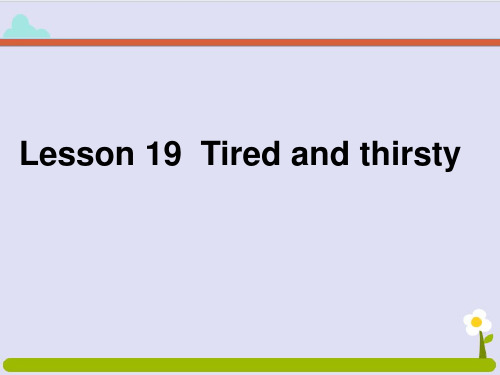
Exercise B
Are his cases heavy or light? They are not heavy. They are light.
Exercise B
Are grandfather and grandmother young or old? They are not young They are old.
We are thirsty for success.(成功)
振振有词
right
I don’t feel right today.
身体健康的
We write with(用)our right hand. 右边
-Are you a student. -Yes,you're right.
正确的
Watch the video
Are her trousers short or long? They are not short. They are long.
Lesson 19 Tired and thirsty
new words presentation
2024/8/6
stand up(起立)
children tired
根据图片说出相应的单词
boy sit down ice cream
mum
thirsty
振振有词
tired
累的
I'm tired.
Grandmother and grandfather
The boy and the girl
passage presentation The hats
passage presentation The man and the woman The policemen
新概念英语第一册第19-20课教案(经典教案课件)

Lesson19Tired and thi rsty[词汇](9)★matter n.事情(尤其强调麻烦)①n.事情,事件It's a private matter.He's not very interested in such matters.②n.麻烦事,困难What's the matter?=Tell me what's wrong?eg.What's the matter with+sb./sth.What's the matter with you today?你今天怎么回事?What's the matter with the children?③v.要紧eg.It doesn't matter,没关系。
It matters to him,和他有关系。
Does it matter?有关系吗?可以吗?短语:eg.as a matter of fact事实上,其实=in factno matter无论no matter where you go=wherever you go无论你去哪里no matter what you do=whatever you do无论你干什么(以上2句在《right here waiting for you》一歌中出现)★children n,孩子们(child的复数)eg.Tom is a lovely child.baby婴儿the only child独生子女childhood童年(-hood后缀)(通常表达一种状态,做儿童的状态)my childhood我的童年motherhood做母亲的那种状态一为人母fatherhood为人父neighborhood街坊★tired①adj.累,疲乏eg.Jack always has lots of work to do and he feels tired.②adj.厌烦的be tired of sth./doing sth.厌烦做某事(be tired of对什么感到很累,引申为“厌烦,讨厌”。
Lesson19-20笔记(素材)新概念英语第一册

新概念英语第一册Lesson 19-20讲解单词讲解:1.matter n. 事情,事件,麻烦事,困难;V. 有关系,要紧This matter is important to me. 这件事对我很重要。
What's the matter, Anna ?怎么了,安娜?It doesn't matter. 没关系。
2. children n.孩子们(复数)child n. 孩子(单数)kid-kidsChildren love to play in the park. 孩子们喜欢在公园里玩。
3. tired adj. 累的,疲乏的dog-tired 极度疲乏的(累成狗)I am tired. 我很累。
Is he tired? 他很累吗?4.boy n. 男孩The boy loves to play with his toys. 男孩喜欢玩他的玩具。
I am thirsty. 我口渴了。
hungry adj. 饿的6.mum 妈妈dad爸爸7.sit down 坐下stand up 起立8. right1).好的,可以all right=ok-Let's play football.-All right.2). 正确的You are right. 你是对的。
反义词:wrong 错误的3). 右边的on the right 在右边反义词:left 左边的on the left在左边9. ice cream 冰淇淋ice 冰cream奶油;乳酪;面霜10.big 大的,反义词small 小的风大,雨大,雪大用heavy声音大用loud年纪大用old面积大用large11.open1). adj. 开着的反义词:shut 关着的The door is open. 门是开着的。
Please open the door. 请开一下门。
12.shut1). 关着的,停止营业的,相当于closedThe window is shut. 门是关着的。
新概念英语第一册第19_20课件

I
my
you
your
mine yours
he
his
his
she
her
hers
we
our
ours
you
your
yours
they
their
theirs
Lesson 19-20
Tired and thirsty
Revision 复习
Mr. Jackson: _____ and meet our ______, Mr. Richards. Mr. Richards: Thank you, Mr. Jackson.
ice cream
tired
right
boy
sit down
thirsty
事情
疲劳的
冰淇淋
孩子们
好,可以
男孩
坐下
口渴的
• matter 事情
• 你怎么啦? What’s the matter (with you)? = What’s wrong with you?
• 手表怎么啦? What’s the matter with the watch? = What’s wrong with the watch?
['taiəd]
adj. 累的,疲
[bɔi] ['θə:sti] [mʌm] ['sit-daun] [rait]
n. 男孩 adj. 口渴的 n. 妈妈 坐下 adj. 好的,可
matter
children
thirsty
sit down
ice cream
right tired来自matterchildren
新概念英语第一册课后练习题及答案:19-20

新概念英语第一册课后练习题及答案:19-20 Written exercises 书面练习A Complete these sentences using am, is or are.抄写以下句子,用am, is或are填空。
Example:Those children ______ thirsty.Those children are thirsty.1 Those children ______ tired.2 Their mother ______ tired, too.3 That ice cream man ______ very busy.4 His ice creams ______ very nice.5 What's the matter, children? We ______ thirsty.6 What's the matter, Tim? I ______ tired.B Write questions and answers.模仿例句提问并回答。
Example:his shoes/(dirty)/cleanAre his shoes dirty on clean?They're not dirty. They're clean.1 the children/(tired)/thirsty2 the postmen/(cold)/hot3 the hairdressers/(thin)fat4 the shoes/(small)/big5 the shops/(shut)/open6 his cases/(heavy)/light7 grandmother and grandfather/(young)/old8 their hats/(old)/new9 the policemen/(short)/tall10 his trousers/(short)/long答案:Lesson 20A1 Those children are tired.2 Their mother is tired, too.3 That ice cream man is very busy.4 His ice creams are very nice.5 What's the matter, children? We are thirsty.6 What's the matter, Tim? I am tired.AnswersB1 Are the children tired or thirsty? They're not tired.They're thirsty.2 Are the postmen cold or hot? They're not cold. They're hot.3 Are the hairdressers thin or fat? They're not thin.They're fat.4 Are the shoes small or big? They're not small. They're big.5 Are the shops shut or open? They're not shut. They're open.6 Are his cases heavy or light? They're not heavy. They're light.7 Are grandmother and grandfather young or old? They're not young. They're old.8 Are their hats old or new? They're not old. They're new.9 Are the policemen short or tall? They're not short.They're tall.10 Are his trousers short or long? They're not short.They're long.。
新概念英语第一册19-20课课件
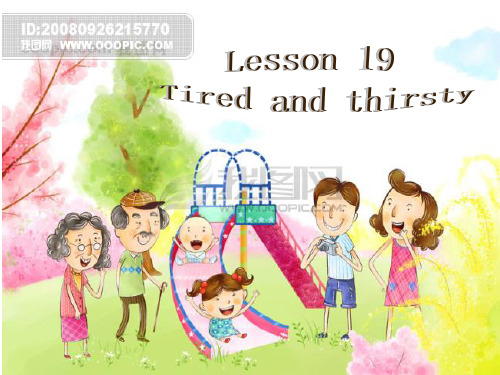
box/heavy/light
选择疑问句
Is the woman thin or fat? She is fat.
woman/thin/fat
选择疑问句的复数形式
用第20课的图片使用选择疑问句看图说话。
Are Simon's shoes clean or dirty? They are clean. Simon’s shoes/clean/dirty
therebe句型变换?如果一个句子中有be的形式存在那么这个句子的疑问或否定形式都在be本身变化比如一般疑问句只要把系动词提前否定句就在be后面加not就可以了
New words and expressions
• matter ['mæ tə] n. 事情 • children ['tʃildrən] n. 孩子们 (child [tʃaild]的复数) • tired ['taiəd] adj. 累的,疲乏的 • boy [bɔi] n. 男孩 • thirsty ['θə:sti] adj. 口渴的 • Mum [mʌm] n. 妈妈 • sit down ['sit-daun] 坐下 • right [rait] adj. 好的,可以 • ice cream ['ais-'kri:m] n. 冰淇淋
Mother: Two ice creams please. • ice cream 可数名词,复数形式是 ice creams • give us two ice creams 给我们两个冰淇淋
Mother: Here you are, children. Children: Thanks, Mum.
---------women
新概念英语第一册第20课 Look at them
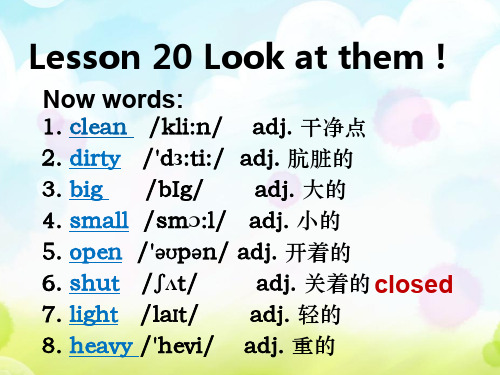
Look at this ! It is a big.
Look at the windows! They are shut /open!
Look at the ....! They are light / heavy.
Look at the ....! They are hot / cold.
clean hot big open light long
cold
small
short
dirty
heavy shut/( close)
Let's this shoes dirty or clean? They’re not dirty. They’re clean.
Lesson 20 Look at them !
Now words:
1. clean /kli:n/ adj. 干净点
2. dirty /'dᴈ:ti:/ adj. 肮脏的
3. big /bIg/ adj. 大的
4. small /smƆ:l/ adj. 小的
5. open /'əʊpən/ adj. 开着的
6. shut /ʃɅt/
adj. 关着的 closed
7. light /lаIt/ adj. 轻的
8. heavy /'hevi/ adj. 重的
--Look at them! What can you see?
--I can see three boats , They are small.
hot------------cold
They are clean.
人称代词主格做主语,放在
They are dirty. 动词之前。
They are hot. are 系动词
- 1、下载文档前请自行甄别文档内容的完整性,平台不提供额外的编辑、内容补充、找答案等附加服务。
- 2、"仅部分预览"的文档,不可在线预览部分如存在完整性等问题,可反馈申请退款(可完整预览的文档不适用该条件!)。
- 3、如文档侵犯您的权益,请联系客服反馈,我们会尽快为您处理(人工客服工作时间:9:00-18:30)。
•2.该句式中be动词的单复数形式取决be动词后面 的名词:be动词后面的名词是单数,be动词用is; be动词后面的名词是复数,be动词用are.
There is a boy in the room. There are three red apples on the table.
3).如果该句式的主语是由几个名词并列构 成,则按就近原则处理,即与靠近be动词 的第一主语保持一致 There is a book, a dictionary and two pens on the desk. There are two pens, a book and a dictionary on the desk.
How many ice creams do they want?
Mother: Here you are , children. Children: Thanks, Mum Girl: These ice creams are nice.
These windows are open. How are the ice creams?
Nice to see you back !
Lesson19
Tired and tห้องสมุดไป่ตู้irsty
Why do the children thank their mother?
Because their mother buy ice-creams for them.
Mother: What’s the matter, children? What’s the matter with you ? What’s wrong with Lily ? …怎么了?/…有什么事?
4.There be 句式变疑问句时,只需要把 be动词提到there的前面就可以了。 There ___ is a policeman in the room.
Is there a policeman in the room?
Yes, there is . / No, there isn’t.
5. There be 句式变否定句时,只需要把 be动词后面加not就可以了 There is not a policeman in the room.
Those boxes are heavy.
Mother: Are you all right now?
Children: Yes, we are, thank you!
There be 结构的用法
•1.There be 句式通常带有一个地点,表示 在某地有某物。如: There is a blackboard in the classroom. There are two empty bottles on the desk.
Girl: We ’re tired… Boy: …and thirsty, Mum.
Mother: Sit down here . Are you all right now?
同义句:Are you Ok now?
Boy: No, we aren’t.
Mother: Look! There’s an ice cream man. Mother: Two ice creams please.
练习题
are 5 oranges and 4pears. 1.There ______ is a book and two dictionaries. 2.There ___ 3.There ___ are two maps and a pictures on the wall. 4.There is an ice-cream man near the tree.(变一般疑问 句) Is there an ice-cream man near the tree? ____________________________________________ 5.There is a milkman near the school.(变否定句) ____________________________________________ There isn’t a milkman near the school. There is an apple on the table. 6.桌子上有一个苹果。__________________________
They are happy.
Look at them!!
They are hard-working.
They are shut.
They are open.
bye~
桌子上有一个大苹果和两个小苹果。
There is a big apple and two small apples on the desk. ________________________________________
open
Shut
light
heavy
Look at them!!
